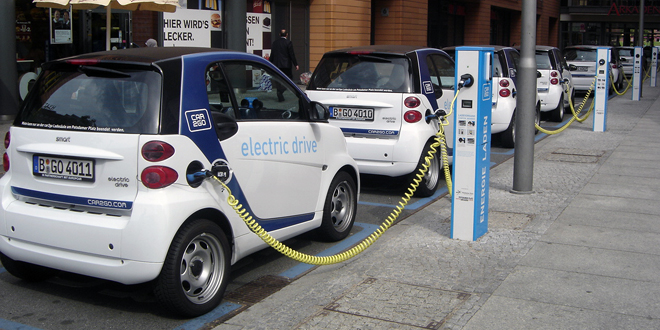Some see car sharing as a killer app for EVs – users make short journeys, return the cars to central locations, and pay per trip, so they don’t have to worry about high up-front costs. Others are more skeptical, pointing out that some customers are non-car owners who want to use shared cars to get to remote locations out of the reach of public transport, or to move heavy objects.
In Paris, the yea-sayers are winning the day. Autolib, which launched in late 2011 with a fleet of 250 cars, now has 1,800 EVs and 4,000 dedicated charging points. Customers have made over two million trips, and have made the City of Light one of the world’s EV capitals.
Autolib is owned by French industrial conglomerate Bolloré, which partnered with Italian car designer Pininfarina to build the two-door Bluecar. Bolloré also developed its own battery, which uses a proprietary lithium metal polymer (LMP) technology. The Bluecar’s 30 kWh LMP battery provides a range of around 200 km.
Autolib General Director Morald Chibout predicts that the company will turn a profit sometime next year. It plans to expand to the French cities of Lyon and Bordeaux later this year, and to Indianapolis early in 2014.
Daimler subsidiary Car2go introduced electric car sharing to Amsterdam in 2011, and has since expanded to Austin and San Diego.
“Car sharing is a good way for people to get experience with EVs and to demystify the whole process,” says Richard Jones of the International Energy Agency. “It can help EVs prove themselves to the public.”
Similar ventures in other cities have been less successful. Peugeot Citroën operates a car sharing program in Berlin with 350 EVs, but has no plans to expand that number unless the city decides to offer subsidies. According to spokeswoman Carolin Reichert, the problem is that buying and operating an EV costs about $400 more per month than an old-fashioned gas car.
Swiss car sharing service Mobility began offering EVs in late 2011, but currently has only 19 Think Citys in service, out of a total fleet of 2,650 vehicles.
Image: harry_nl (flickr)
Source: IEEE Spectrum, Mobility.ch, car2go


















































